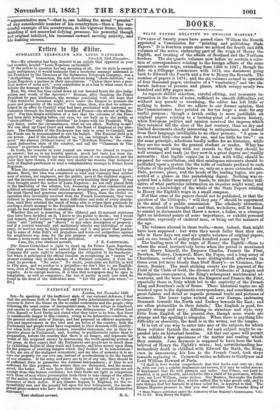Erting tu t48 Mar.
SUBMARINE TELEGRAPH AND LOUIS NAPOLEON. Cornhill, 12th November. Six—My attention has been directed to an article that appeared in your last number, headed "Louis Napoleon on Cornhill." If the article in question has any meaning at all, (for its style is exceed- ingly ambiguous,) it would insinuate that a courteous message addressed to the President by the Directors of the Submarine Telegraph Company, was a
stockjobbing " transaction, the said directors being "share-dabblers," and Louis Napoleon a partner in their speculations. "Unless there were a prac- tical motive of some sort," your contributor is at a loss to what cause to at- tribute the message to the President.
Now, Sir, what has thus called down our devoted heads the dire indig- nation and wrath of the Spectator ? Because, after thanking the Prince President for past kindnesses, the message concluded with the hope that "this wonderful invention might serve under the Empire to promote the peace and prosperity of the world." Our crime, then, was that we acknow- ledged in an office on Cornhill what had been proclaimed with universal ac- clamation through the length and breadth of Franee--the advent of the Em- pire ! For this simple admission of a fact that the columns of the Times bad been daily bringing before our eyes, we are held up to the -public as "stock-jobbers" and " share-dabblers " in league with the President. Why, only fancy, under the circumstances, what we can effect. Nothing is safe ! We can shut up Capel Court and smash the Bank of England at our plea- sure. The Chancellor of the Exchequer has only to come to Cornhill, and the Funds can be accommodated to suit his budget. The NationalDebt lain our power. And if the nation offends us, we can telegraph to the "Em- peror" the absence (without leave) of the "Horsham Heavies," the conse- quent defenceless state of the country, and call the " Chasseurs de Vin- cennes" to garrison Cornhill.
In truth, the remarks in your journal are almost too absurd to require an answer; but as, in my humble opinion, much bad taste has been dis- played in not only wanton but mischievous abuse of our neighbours and the ruler they have chosen, I will state very shortly the reasons that induced. a body of English gentlemen to send a complimentary message to Prince Louis Napoleon.
When the construction of a submarine telegraph was first proposed by the Messrs. Brett, the idea was considered so wild and visionary that neither men of science, nor engineers, nor the public, gave it the slightest support ; and the inventors were almost hopeless of ever realizing their plans. It was then brought under the notice of Louis Napoleon : he not only placed faith in the feasibility of the scheme, but, foreseeing the great commercial and political advantages that would attend its development, gave the promoters the most liberal and generous encouragement. Thus, from the cordial co- operation they invariably received from the French Government, they were induced to persevere, through many difficulties and risks of every descrip- tion, until they attained the result of being able to evince their gratitude by sending a direct message to the President from Cornhill to. Paris by the tele- graph he had assisted them to establish.
Whether this act is deserving of the illiberal and ill-natured strictures that have been lavished on it, I leave to the public to decide ; but I would
la- t remark, that I believe " newspapers" are as much a matter of " specu- tion " and "jobbing" as " shares" or any other description of property ; and if a journal wantonly and maliciously attacks any individual or com- pany, its motives may be fairly questioned, and it may prove that pander- ing to some of John Bull's old prejudices and worn-out antipathies against his neighbours was done for the sole purpose of creating among certain classes a more ready market for such periodical.
[Sir James Carmichael is right to stand up for Prince Louis Napoleon, since that person has so well earned Sir James's esteem. The Submarine Company did quite right to acknowledge the obligation to its benefactor; but when it anticipated the official function in recognizing an " empire" at present existing only in the schemes of a Parisian coadjutor, it went be- yond its province. "Ne sutor." No doubt, journalists are fallible as well as City men, and we confess to a prejudice—we don't like to see English- men, even of the trading elasses, playing into the hands of a Napoleon Bo- naparte. As to corrupt motives, it is true that newspapers may be open to temptation, as well as companies; the test of purity in each case must be found in the lives of the individual men. "Let the galled jade wince— En.]


























 Previous page
Previous page